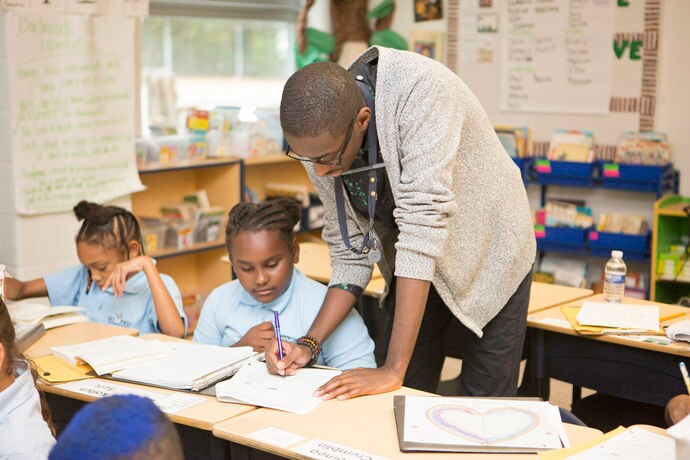A D.C. Corps Member Who Infuses Joy and Identity in His Classroom

December 5, 2018
Corps member Jonathan Hogue (D.C. Region ’17) is a third-grade teacher at DC Prep Benning Elementary Campus. You can feel from the moment you enter his classroom that Jonathan is a passionate educator. His students are at ease and eager to participate, laughter is present at every turn, and scholars show respect for one another. When Jonathan calls out a question, the hands of almost every student shoot up. If one student struggles, the rest of his class is ready to jump in and help.
Read more to find out about where Jonathan’s love for learning comes from, and what his school community means to him.
Why did you apply to TFA?
When I was doing my year with CityYear, my seventh-grade students were asking me to come back to teach them in eighth grade. I knew after working with my students that I wanted to continue working in a classroom.
Education is a really big part of my life in terms of what my family instilled from a young age. My dad could only read up to about a third or fourth grade reading level, and my mom didn’t have the money to go to college, so for both of them, education was very big. I feel really connected to the idea of being a black educator, making sure I’m giving back to my community and doing different things that move the needle, trying to keep the rigor high for all students regardless of their racial background or economic status.
Did you have any meaningful teachers that contributed to that?
I’m very fortunate when I think back to my first teacher—my dad. He would always say, “Please keep working in school and do the best you can.” And my mother was so big with making sure that I felt a love of learning and that I felt the classroom as a place where I shouldn’t be stifled to be creative. From a young age, she said, “Just because the world looks at you differently, doesn’t mean you should have different standards for yourself.”
When you first started in the classroom, what were some challenges you faced?
I remember calling home and feeling terrible for how ignorant I was of just how polarizing our American education system is. I remember talking about this stuff in college and thinking, I know this stuff happens, but I don’t think it’s happening at a high rate. It surprised me how disjointed the school system was from my perception.

Has your opinion of teachers changed as a result of the corps?
I’ve always had a high respect for teachers, but there are so many roles we have to take on. We take on the role of educator, but sometimes you’re the parent, or you’re a doctor, or a counselor. Especially in schools where the neighborhoods are under-served, the parents are truly looking for you to be a model for their students because they want the very best for their students. Our parents are wanting the teachers to be reflective of community changes going on. I didn’t know a teacher could have this much impact on their students and to encourage them to think this much about the world around them. For a teacher first starting out, it’s OK to tell them that you will not have all the answers and you will make a lot of mistakes.
Are there other values that are important to you to uphold with your students?
Perseverance is one thing. For my students, I let them know, the work is going to be very difficult and I expect them not to give up and to really try their best. I don’t expect perfection, but I expect that they try.
Another thing that I aim for is humor. People will do anything if you make them laugh, or if you make the environment one where they feel comfortable making a mistake. I very much enjoy when I see students laughing and building community with one another. And the third tenant I look for is that we’re all respecting one another. We try our hardest. We laugh when we can. We expect there’s a lot of work to do and everyone is going to get where they need to at the time that’s right for them.
How do you speak your truth or bring your own personal truth to the classroom?
When I first heard the statistics about the lack of black educators in the classroom—only 2 percent nationwide—I thought, you’ve got to be kidding me. It’s crucial for students to have educators who look like them, who come from the same experience, who use the same language.
I’ve only had two educators of color my whole life, and I didn’t get those until college. So I really want to make sure that my students see someone who looks like them during these formative years. I really want them to take pride in their blackness and their identity. As a black educator I would be doing a huge disservice if I didn’t talk about this with my students.
Are there any things your students have taught you since you’ve been in the classroom?
Last year, my father passed going through his battle with cancer, and I was out for two weeks. When I came back, the kindness that my students showed me, and the community they built around me, taught me you never go through anything alone. There’s always someone there who is trying to help you. And at the end of the year, we had built a beautiful community.


